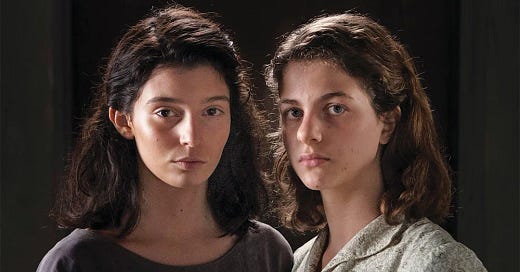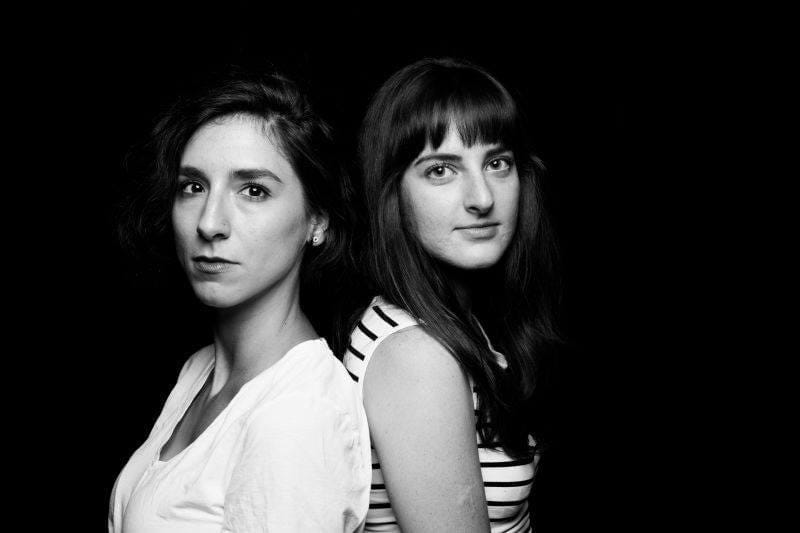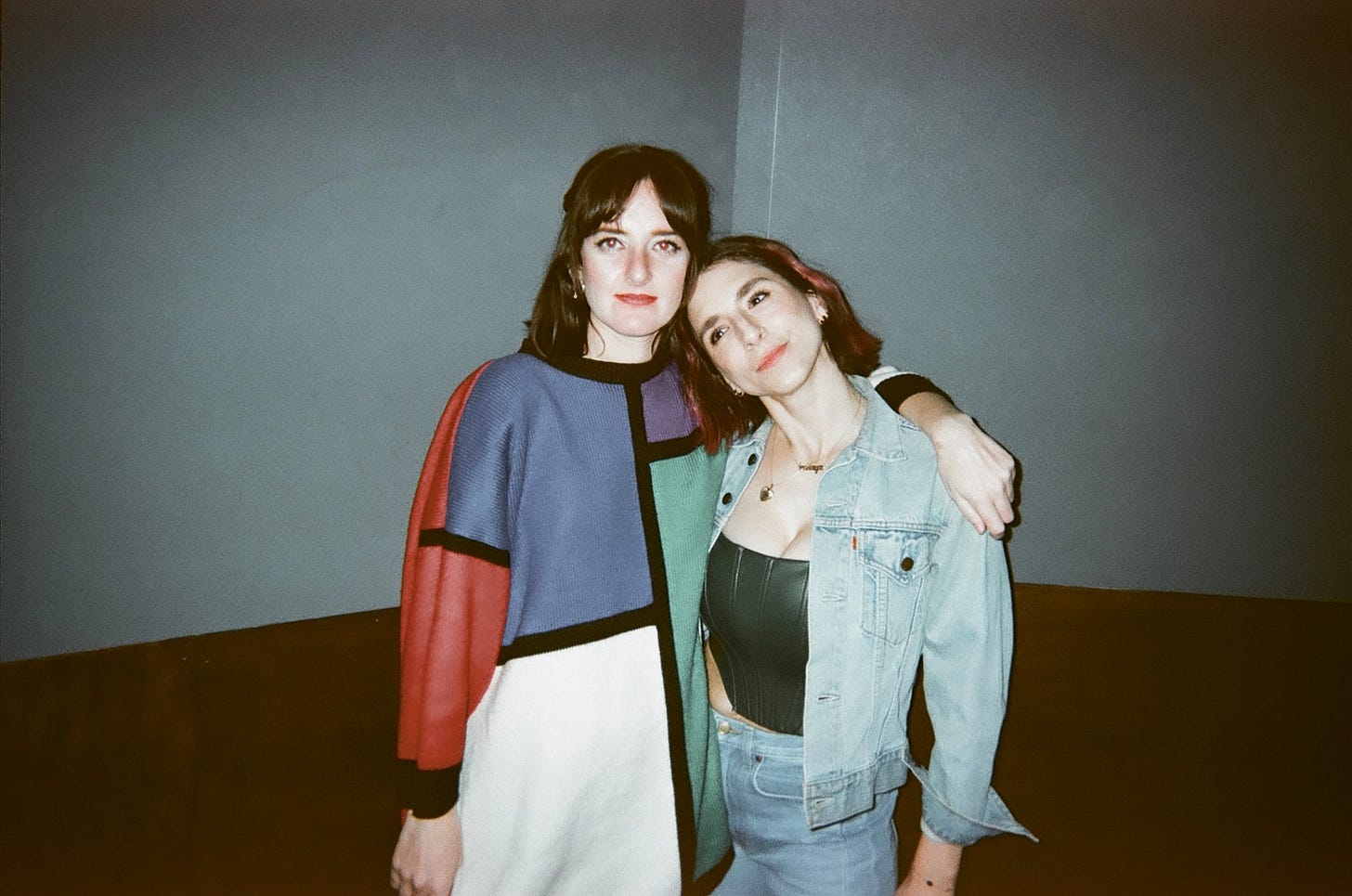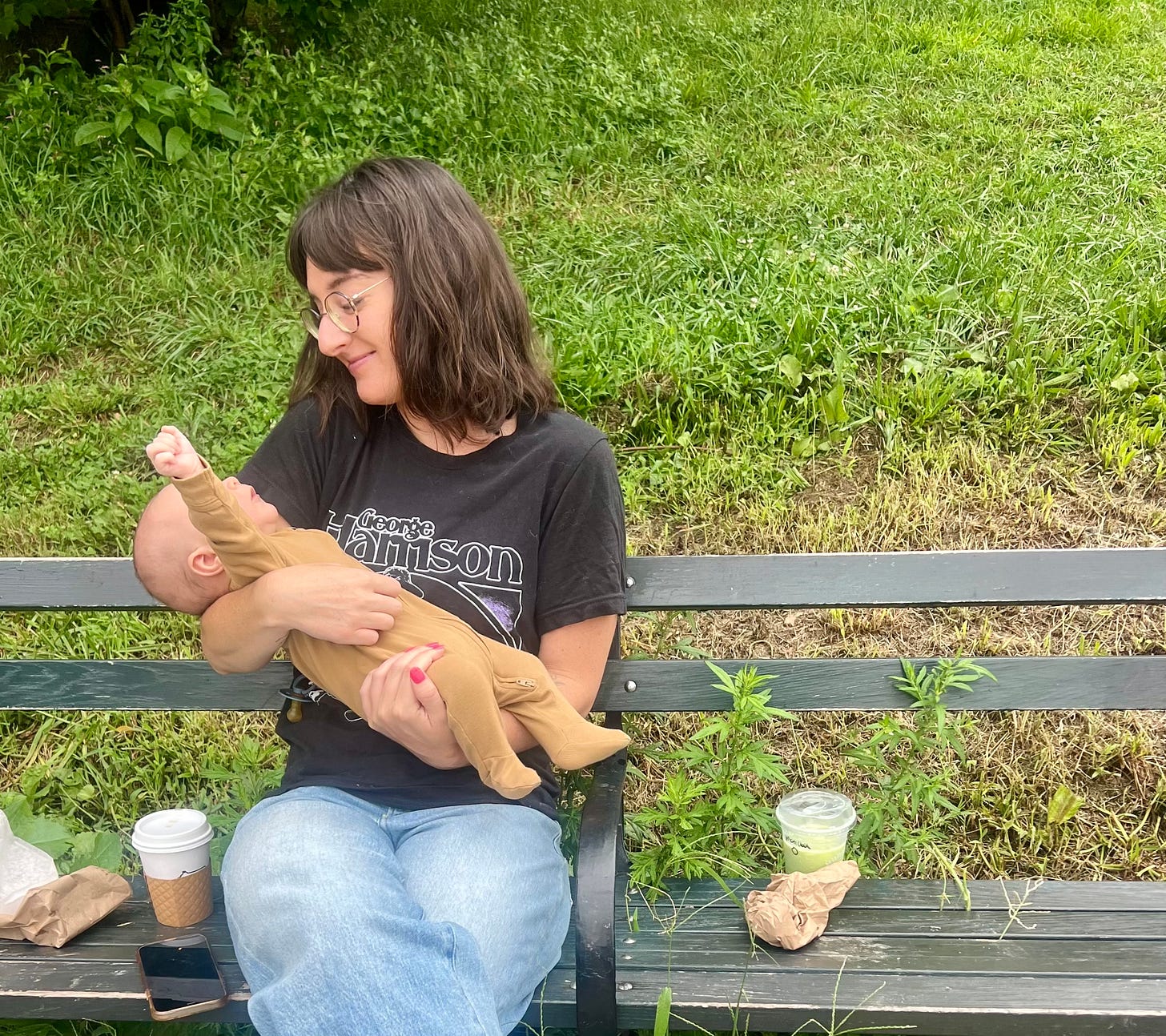On Saturday mornings, my friend wakes up to the sound of a crying baby and pushes him in his meticulously researched stroller to the farmer’s market and into the children’s section of the public library. The baby looks like his dad, according to her and everyone else.
When I look at the baby, I see my friend’s bright spirit in his eyes and the mix of joy and exhaustion in hers. She hoists him into the air, now confident in his durability at a sturdy eight months. He’s becoming a person, like us. He’s cute and charming and doesn’t know that he won the parental and genetic lottery. For now, he just likes to shake his head “no” because it gets his parents to laugh.
My Saturday mornings, which take place just two miles from my friend and her baby, begin when I pitch myself out of bed and walk the dog in a fugue state of my own making. I may have blown out my voice at karaoke. Maybe I was in my bathtub in the middle of the night, winding down from a marathon evening of being socially “on.”
Hopefully the morning jaunt with my dog brings to mind the electric experience of making a new friend at a party. Other times, each step of that walk is a drumbeat of recriminations.
For nearly a decade, seeing my friend Hannah has felt like looking into a mirror. Our lives were already drastically different before she had a baby: She’s been married to the world’s best partner since she was in her early 20s; she has watched me weep over men who never remotely met her standard for what she feels I deserve. She is familiar to me in a way that feels like watching a much wiser and hotter1 version of me walk around in our shared world.
To my surprise, I thought a lot about how my own life would change when my friend had a baby. I already knew the shape in which hers would change, but I didn’t anticipate spending her second trimester writing in my journal about the upcoming divergence in our lives.
We have matching tattoos. We had matching professions. We have matching insecurities and anxieties and cope with our problems through wearing outrageous clothes. But as her due date grew closer and the baby shower was over and her own mother told us over email that “Hannah has decided the baby's primary color will be sage2 (at least until he picks his own favorite color),” I felt a chapter of my own life closing. I worried about how to support her the most in the next chapter of hers.
I joked recently that this baby belongs to me, too. His dad quipped that I could claim custody after picking up a few overnight shifts. But I do feel a responsibility for the comfort of his life, despite my lack of diaper duty and genetic contributions. He’s an extension of someone I love. It is my great honor to already be designated as the person who will teach him to smoke weed safely. His parents don’t know how to teach him that — finally, I have an assignment for this baby, even if it will require a sixteen-year payoff.
The interconnectedness of women and the lives we choose to make has been a central theme of nearly all of the art I’ve consumed since I became an adult. The dances women do around one another and the mistakes and triumphs of our lives is depicted searingly in Elena Ferrante’s “Neapolitan Novels.” The subsumable nature of relationships between women is the obvious theme to me in Ingmar Bergman’s 1966 film “Persona.” Cinephiles have spent sixty years decoding the message of that movie: It’s about women and the dilemma we face of how to get the most out of our lives. I’m happy to have settled that debate, you’re welcome.
In reality, there exists a web between women that most of us don’t want to acknowledge or let become seen. It’s made up of idolatry, envy, general fears about what we share with our mothers, a fine-tuned tonal perception, and the search for meaning in the ways that we are different or — sometimes more acutely — the ways in which we are the same.
The cause of this tension is the omnipresent sexism that is both ingrained and overt in our society. We are in this together, but the ceaseless forces that designate us as the weaker gender often means that it’s easier for us to try to beat one another than it is to try to beat the system.
This tension broke the connection between me and Hannah when we were old enough to do better but young enough to fold to its forces. We spent years letting this competitive tension keep us apart while we operated in the same orbit. It was ugly and robbed us of the companionship our younger selves deserved. I was the one who made it brutal and bloody and to make an enemy out of my most obvious ally is the great humiliation of my life.
Reconciliation (which began with a four-hour conversation on a spectator bench outside of a Major League Baseball spring training facility) hurt deeply before it allowed me to heal. It caused me to investigate my moral inventory and the many ways in which my actions and my beliefs were not aligned. I learned more from fucking up a friendship than I’ve ever learned from doing something right.
“That’s the fallacy about hating someone, disagreeing with them, viewing them as your enemy,” Scaachi Koul writes in her new book Sucker Punch. “It’s still a form of intimacy.”
Hannah and I have confessed to each other that the care between us never dissolved even when communication did. We were, spiritually, still friends even when we pretended we were not. The conclusion of this fraught period of my life taught me everything I needed to learn about who was actually on my side. We are now closer than ever, despite our life trajectories veering sharply apart.
But it’s hard to figure out how to be a friend to your female friend who has just had a baby. What did she need, I wondered? I tried to ask, but how can someone going through the most radical change a person can undertake know what they will need when their life becomes something completely new to them? I sliced up an entire pineapple when she came over to my apartment one day while pregnant. She wasn’t ravenous for it, only a slight craving, but she had given me a hint on how to help and I took it to its most extreme.
As her pregnancy progressed, I racked my mental inventory about what pregnant people and new mothers have said about what they felt they needed during that time. I know that some women feel that motherhood robs them of the individuals they were up until the moment they gave birth — should I try to honor her own identity by treating her like we were still just two well-dressed girls out in the big dumb world?
Does she need to talk about the weird gross things about new parenthood and the psychotic hormones that flood her body when the baby smiles at the sight of her? When will these people let me pick up those overnight shifts? I’m dying to be trusted enough to assist and to form my own friendship with this person who will one day have access to language and opinions and tendencies that drive his parents up a wall.
But it’s impossible for me to relate to what she is experiencing. I embarrass myself by trying to find commonalities out of apples and oranges. Her baby caught the flu and it upended her life for a month. My dog vomited twice and I thought he, and therefore I, was going to die. Isn’t it agonizing to be the designated caretaker for a being who has no language or autonomy, I offered.
It’s farcical — the feelings may be similar, but the scale and stakes of her responsibilities are beyond my comprehension. So, I feel an intense devotion to this baby and his well-being because I know that will be the central concern of the rest of her life.
Yet even as she exhausts her energy pouring her care into her enviably adorable baby, Hannah somehow has some left over for me. She investigates my self-made dilemmas like some sort of therapist-anthropologist. She monitors how I respond to adversity and grief. And the most important day of our decade-long friendship came at the sharpest divergence of our lives.
On the very first day she could see me after I learned I’d accidentally become pregnant, Hannah dragged her infant baby and ever-supportive husband across boroughs and into my favorite museum. We watched as the baby registered the concept of “dance” in an immersive exhibit about Alvin Ailey. We joked that he had no idea that legs could even support a person’s body, but he found something captivating in their movement. It was amazing to see him fascinated by something he had no way to understand.
After our time at the museum, we all went to indulge ourselves at Shake Shack. The baby instinctually rejected his bottle of milk as he tried to get ahold of his mom’s milkshake. I cheered on his rebellion and I hope I’ll have the chance to support him in many, many more.
There’s a photo from that day with me holding the baby on my lap — him acquiescing to the boring bottle of breastmilk while I downed my own frozen dairy beverage. Her two hapless charges, drinking milk and leaning on her emotionally when the only language he and I each had at that moment was to cry.
She took her baby home that night while I prepared to not have mine. It was a visceral moment of our lives taking genuinely opposing turns. But the distance in our choices hasn’t drifted us apart. We’re still just two ladies in flamboyant clothing, taking on the gravity of the choices we’ve made for ourselves.
Hannah says: “I quibble with being wiser and hotter! I’m an idiot,”
Seriously, dude?









Reading you is a special experience that often leaves me with mixed feelings. There's empathy, for the complicated situations you've had to face, and admiration too for the ease and quality with which you manage to relate them. I don't know if this is your goal, but I hope that one day you will be able to put it all into a book. Thank you.
You and Hannah are both fantastic writers, and I've thoroughly enjoyed your work over the years. In many cases, much more so than many of your male counterparts. The craft and the care shine through in your work. Thank you for sharing something insightful, personal, and difficult to express.
You once responded to a tip email I sent in about a baseball stat. Even in that briefest of interactions your enthusiasm for the subject matter was palpable. And it came at a difficult time where that positivity really helped to lift me up. Thank you for that even more.